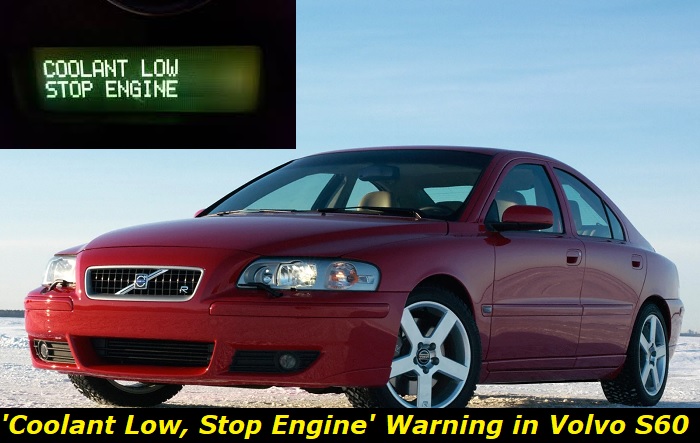Warning messages these days can have so many different interpretations that it can often become quite difficult to tell what exactly is wrong with the car. However, messages such as the "Low Coolant Level" shouldn't be too complicated to understand.
Coolant low, stop engine message highlights
- Common reasons:low coolant level, bad sensor
- How to fix:check the coolant level, replace the sensor
- Possible consequences:engine overheating will kill the engine
- Priority level:High
- Can you drive?Carefully
- DIY repair:Possible
- Repair price range:$20-$250

What causes this message to appear in the instrument cluster?
Although you might be tempted to think that the only reason this message appears in the instrument cluster is not having enough coolant, it is important to understand that there can be so many more reasons for which it might be triggered, some of them being quite a lot more expensive to fix.
Here are some of the reasons you might get the "Coolant Low, Stop Engine" message in the Volvo S60:
- Low coolant level
Sometimes, the error message you get will literally tell you exactly what you should do to make the car happy again. While coolant losses are not particularly normal, a very low amount could evaporate after a longer period.
If you've had your car for a few years already and you have covered up quite a lot of miles, then it might be the case. In situations like these, the vehicle will normally take just a small amount of coolant and it should be good to go again.
- Air trapped in the cooling system
While this might not always cause this message to appear, you should check that there is no air in the system, especially if the error appeared only after a coolant flush or after work on the cooling system.
- Faulty coolant reservoir cap
The coolant reservoir cap can often fail, leading to coolant spewing from the expansion tank. They are designed to hold some pressure, but they are not meant to seal 100% since in cases in which there's too much pressure, they are meant to be the weakest link to the cooling system through which excess pressure will be eliminated.
- Faulty coolant temperature sensor
The sensor itself is a component that will quite often fail and it might lead you into thinking that you have a more severe issue. If the coolant level seems fine and the car doesn't overheat, this should be a good sign that will usually tell you that the actual fault is the coolant temperature sensor.
Performing a diagnostic on the vehicle could help you a lot since it should tell you if there's an error related to this sensor and you could also read the coolant temperature in real-time.
- Leaking O-rings/seals
Components in the cooling system such as the water pump or the thermostat have O-rings which can sometimes fail, even if the parts themselves are still working just fine. Keeping an eye on them will usually tell you if there's a leak. It's also important to know that coolant will dry out quite quickly, so you should check this as soon as you get the message.
- Leaking radiator
Every time you park your car somewhere you find a puddle of fluid under it? Check the radiator, since they can develop leaks sometimes, especially after many miles of highways, where they are prone to be damaged by stones from the road.
If your vehicle has underside protection, you might not find any puddles under it, but when looking from the engine compartment, you might notice that the protection itself is quite wet.
- Leaking coolant hoses
Just like radiators, they can develop leaks over time. Also, if the vehicle is a little bit older, expect them to start developing leaks, since they are made out of rubber and plastic and, as you might already know, they are prone to cracking with time.
- Leaking heater core
Does the interior of the vehicle start smelling very sweet after you turn the heating on? Have you found your interior carpets soaked in an unfamiliar fluid? Does the heating function lack efficiency or even not work at all?
These are all signs that the heater core is faulty and might have developed a leak. This is a particularly annoying issue since most of the time it requires the entire dashboard of the vehicle to come out for the heater core to be replaced. This might not be the case with your vehicle, but you should better check before so that you know what to expect.
- Leaking EGR cooler
On vehicles fitted with EGR valves, the cooler can develop leaks sometimes and the coolant will end up in the exhaust pipe, thus causing a lot of white smoke to come out of it.
- Bad cylinder head gasket
The cylinder head and the engine block have a gasket between them and if it starts to leak, you are in a bit of trouble. Coolant will start getting into the combustion chamber and it will be burned along with fuel. This is also something that will cause the vehicle to puff out quite a lot of white smoke.
- Cracked/warped cylinder head
This is not something that common, but also not impossible to happen. Just like in the case of the gasket, if it is cracked, coolant will end up in the combustion chamber, yielding the same results as in the situation mentioned above.
How do I fix this issue?
Fixing this issue really depends a lot on what's the actual cause for which this message has appeared in the instrument cluster. As you might have already realized, problems can range from very simple and cheap things to fix to things such as cracked cylinder heads, which will end up in quite big repair bills.
Filling up with coolant is probably the easiest task to do and anyone should be able to do it without any issues. However, two very important aspects should be kept in mind. The first one is to never open the coolant reservoir cap with the engine running or if you've just turned it off. Always wait for at least 15 to 20 minutes for it to cool down enough. The second one is to only use the coolant recommended by the manufacturer.
Replacing the cap or the sensor should be quite easy for any amateur mechanic since they don't require specialized tools and are pretty straightforward jobs. The components themselves are usually quite cheap as well.
Most of the other problems can also be dealt with without specialist help, but they require more knowledge and more tools. Service manuals will usually help a lot in showing diagrams of how components are removed and how they are linked together.
Unless you are willing to do some DIY work and you are very confident in what you're doing, we recommend you leave these jobs to a mechanic, since you wouldn't want to mess with the cooling system and cause irreversible damage.
When it comes to cylinder head issues, we always recommend you take it to a shop that specializes in such problems. The cylinder head has to be removed from the vehicle and taken to a special machine that will tell the specialist what the problem is and if it's beyond repair. This is not something that can be done at home, unless you happen to be someone who has such machines at home, for some reason.
How do I avoid problems in the future?
Avoiding the problems doesn't require too much attention from you, but you also shouldn't be too ignorant of the possible issues.
We recommend you regularly check the coolant level, with the engine cold and with the car parked on level ground, so that you do not accidentally set off without enough coolant. Also, always use the coolant recommended by the manufacturer, since they are fluids designed to work specifically with certain types of engines and cooling systems.
Opening the hood and checking for leaks from time to time is also a good practice since it is better to be safe than sorry. Also, avoid driving hard for long periods and for no real reason, since this will always put a lot of stress on the cooling system and could be one of the main reasons things such as the cylinder head fail.
Should I drive like this?
In a word? No. Any coolant leak can lead to permanent damage to the vehicle's engine and it would be best to avoid driving in these conditions. Even things like coolant temperature sensors that don't usually cause any leaks could lead to catastrophic engine damage since the ECU will not know what the actual temperature is and it might fail to turn the cooling fans on.
Final thoughts
Cooling systems are vital in any vehicle and they shouldn't be overlooked, regardless of what make and model of the car you drive, since their failure will usually result in permanent engine damage, which is pretty much always very expensive to fix.
About the authors
The CarAraC research team is composed of seasoned auto mechanics and automotive industry professionals, including individuals with advanced degrees and certifications in their field. Our team members boast prestigious credentials, reflecting their extensive knowledge and skills. These qualifications include: IMI: Institute of the Motor Industry, ASE-Certified Master Automobile Technicians; Coventry University, Graduate of MA in Automotive Journalism; Politecnico di Torino, Italy, MS Automotive Engineering; Ss. Cyril and Methodius University in Skopje, Mechanical University in Skopje; TOC Automotive College; DHA Suffa University, Department of Mechanical Engineering






Add comment